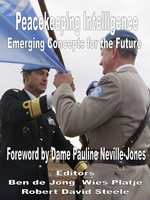Dame Pauline Neville-Jones is Chairman of QinetiQ Group plc, formerly the Defence Evaluation and Research Agency (DERA) which is in the process of privatisation by the British Government. She is also International Governor of the BBC with special responsibility for BBC World Service (radio) and BBC World (TV). She was previously a Managing Director in NatWest Markets, the then investment-banking arm of the NatWest banking group, and Vice Chairman of Hawkpoint Partners, a corporate Advisory house in the City of London. Prior to that, she was a career member of the British diplomatic service serving, among other places, in Singapore, Washington DC, the European Commission in Brussels and Bonn. She was a foreign affairs adviser to Prime Minister John Major, chairman of the Joint Intelligence Committee in Whitehall and leader of the British delegation to the Dayton peace conference on Bosnia. She was made a Dame Commander of the Order of St. Michael and St. George in 1996 and is an honorary Doctor of London and the Open Universities. She is a Council member of the Royal United Services Institute, a member of the Executive Committee of the International Institute for Strategic Studies and of the Advisory Council of the Centre for European Reform in London.
2003 PEACEKEEPING INTELLIGENCE: Emerging Concepts for the Future
Books w/Steele, Decision-Making & Decision-Support, Intelligence (Government/Secret), Intelligence (Public), Peace, Poverty, & Middle Class
With a tip of the hat to the Netherlands Intelligence Studies Association and the Netherlands Defence College who hosted the most original conference on this topic ever, butdid not plan a book, I stepped in to meet the need for such a book. I learned from this group, especially from co-editors Ben de Jong and Wies Patje, and General Patrick Cammaert, RN NL (featured on the cover, in blue uniform) .
The United Nations continues to lack organic decision-support (the same is true of NATO). Being dependent on Member states that either do not invest in decision-support to begin with, or if they do, focus almost exclusively on secret sources and methods, is a certain prescription for issuing uninformed strategic mandates, poorly-devised force structure requets, dangerous tactical rules of engagement, and insufficient technical authorizations.
The book includes excerpts from the Brahimi Report and a Leadership Digest for Peacekeeping Intelligence.




